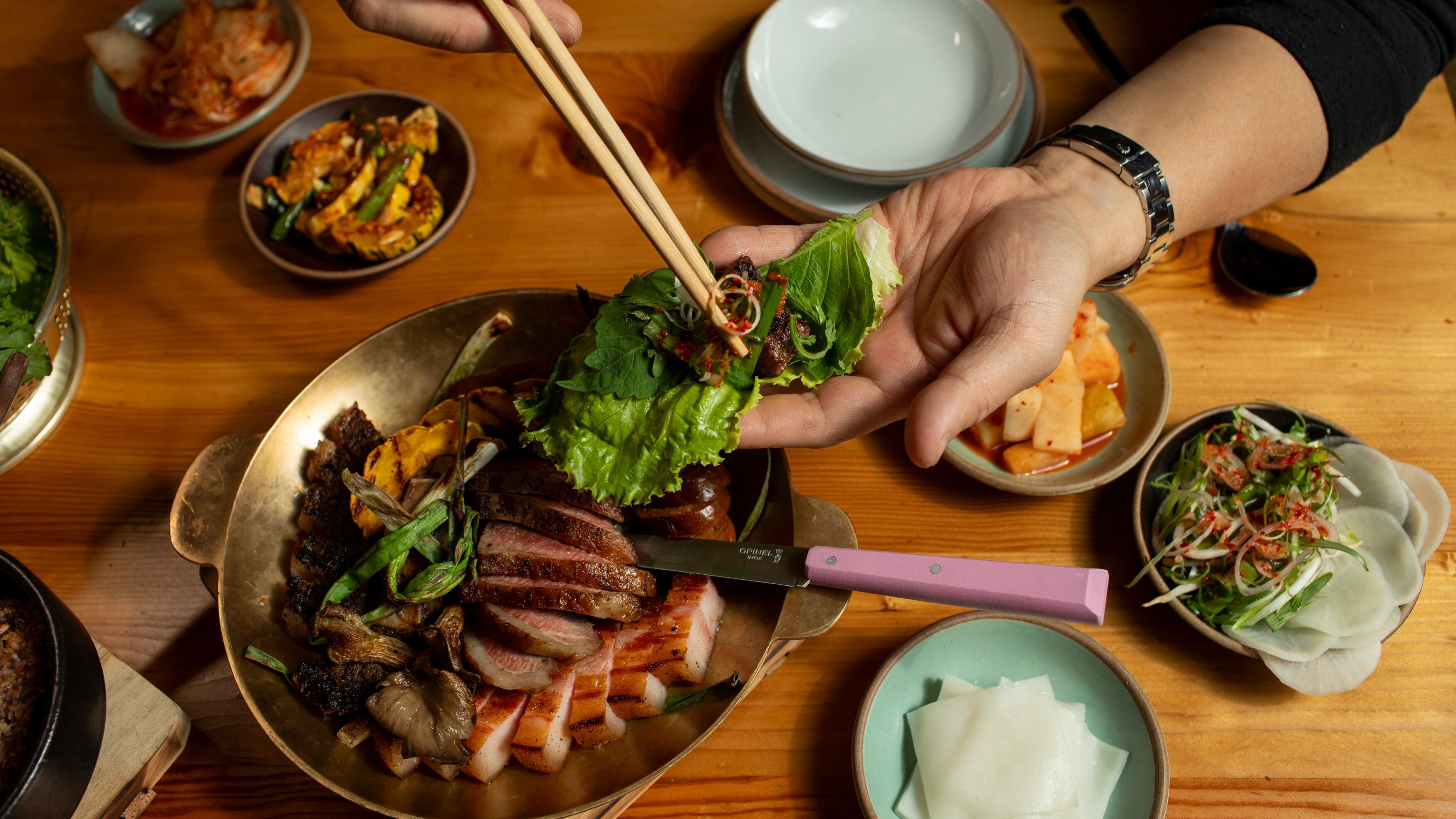If one were to read reviews from other publications about Jeju, the new Korean whole-animal barbecue venture from the owners of Han Oak and Toki, one might think it was a wild ride of a restaurant, all karaoke, fog machines and spraying soju.
It’s not, though, at least not most of the time.
And frankly, for a person who isn’t looking to have their Thursday night dinner be a whole production, that’s totally great. Because far more than being a scene, Jeju is also a restaurant unlike any other in Portland.
Owners Peter Cho and Sun Young Park are offering a twist on Korean barbecue that makes it less about an all-you-can-eat munch fest cooked yourself at the table, and turns it into a considered affair. The philosophy is to use the whole fish, pig, cow or chicken, reducing both cost and waste.
In assuming the former Renata space, a grand buildout in inner Southeast, the Jeju team inherited the Italian restaurant’s wood-fired oven and have put it to excellent use. A seat at the bar near the oven provides a front-row view of crispy rice bowls and meat dishes sliding in and out, as well as additional warmth from the hot fire. Renata’s large neon sign is gone, replaced by more plants and hanging lanterns. A glass-front fridge full of the meats you’ll eat is on display.
The base set menu is $75, with a few additional add-ons along the way, so order an H-Martini, made with Suntory gin and soju, and wait for the plate parade.
I’m nuts for the banchan. Here, this traditional Korean starter array rotates with the seasons, along with a few mainstay dishes. There’s fantastic kimchi of cabbage and turnip that preps you for eating better than any French amuse-bouche, and a recent delicata squash dish offered a salty, sweet sauce with nuts for texture. Thank goodness there’s free refills. A mainstay, and my favorite, is a fluffy cloud of egg dropped in a sea of fish, rich and umami-packed, with pops of salmon roe punctuating the event.
Then come the starters. A fan of soft pink Hawaiian kanpachi sashimi comes in a clear radish water studded with herb oil and dots of spicy yuja chojang sauce. We added on the special kanpachi collar that evening. This decadent and underused portion of fish was deep fried and served in a sticky sweet and spicy sauce, much like pork ribs—worth every penny of the $12 addition.
Han Oak and Toki are already famous for their Korean mandu dumplings, and at Jeju they arrive gyoza style, steamed then fried together with starch to create a lacy, crunchy skirt. They’re fat, made with beef and succulent, and I would expect nothing less.
As those dishes were cleared, I spied the cook working the oven dollop a heaping pat of butter into a stone bowl, adding a multigrain rice and sliding it into the fire. We exchanged a look, and he said, it’s a LOT of butter. It slid in front of us a few minutes later, the hot bowl crisping up that rice. A platter of meat and ssam-style wrapping options showed up too.
Skirt steak, rib-eye, pork coppa and housemade sausage are served sliced, ready to be tucked into lettuce or chicory, slathered with ssam-jang, and topped with herbs before stuffing the packet into your mouth whole cloth. The coppa was a little too salty and hamlike, overwhelming the other ingredients, but the sausage is dialed way in. Well spiced, and not too greasy, it gives its herbaceous sidekicks a delightful boost.
Desserts include a bingsu, the Korean milk ice dessert that arrives as a mountain of shaved ice, and ends up inevitably devoured, no matter how full you are. A chocolate and marshmallow bingsu was great except for the cold temps meant the marshmallow took on an odd, solid texture.
In the future, it may be good to offer a variety of options within the prix fixe format: If too many of the elements—the mandu, the sashimi, the banchan, etc.—remain constant every time, there’s less of a spark to rush back (except, of course, that all of those dishes are excellent).
And even if you’re not there on a night to see Colin Meloy of the Decemberists take to the floor to sing karaoke, Jeju is convivial as it stands. Meat platters, a roaring fire, eating with your hands, and unbridled butter consumption are all enough to make a meal feel like a special event.
EAT: Jeju, 626 SE Main St., 503-502-2038, jejupdx.com. 5–11:30 pm Wednesday–Saturday.
